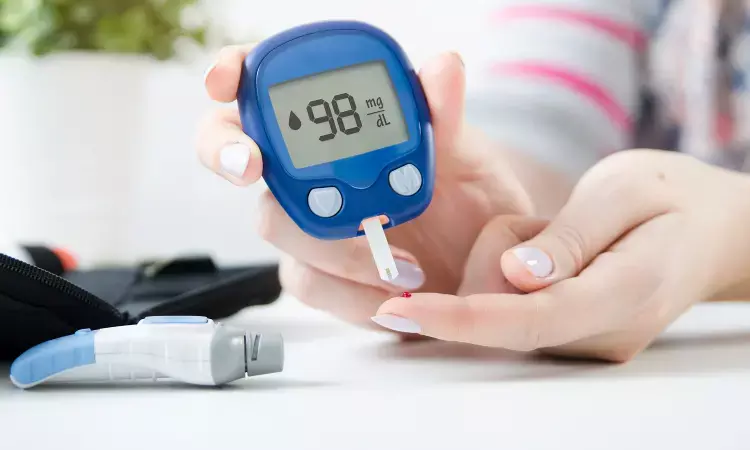- Home
- Medical news & Guidelines
- Anesthesiology
- Cardiology and CTVS
- Critical Care
- Dentistry
- Dermatology
- Diabetes and Endocrinology
- ENT
- Gastroenterology
- Medicine
- Nephrology
- Neurology
- Obstretics-Gynaecology
- Oncology
- Ophthalmology
- Orthopaedics
- Pediatrics-Neonatology
- Psychiatry
- Pulmonology
- Radiology
- Surgery
- Urology
- Laboratory Medicine
- Diet
- Nursing
- Paramedical
- Physiotherapy
- Health news
- Fact Check
- Bone Health Fact Check
- Brain Health Fact Check
- Cancer Related Fact Check
- Child Care Fact Check
- Dental and oral health fact check
- Diabetes and metabolic health fact check
- Diet and Nutrition Fact Check
- Eye and ENT Care Fact Check
- Fitness fact check
- Gut health fact check
- Heart health fact check
- Kidney health fact check
- Medical education fact check
- Men's health fact check
- Respiratory fact check
- Skin and hair care fact check
- Vaccine and Immunization fact check
- Women's health fact check
- AYUSH
- State News
- Andaman and Nicobar Islands
- Andhra Pradesh
- Arunachal Pradesh
- Assam
- Bihar
- Chandigarh
- Chattisgarh
- Dadra and Nagar Haveli
- Daman and Diu
- Delhi
- Goa
- Gujarat
- Haryana
- Himachal Pradesh
- Jammu & Kashmir
- Jharkhand
- Karnataka
- Kerala
- Ladakh
- Lakshadweep
- Madhya Pradesh
- Maharashtra
- Manipur
- Meghalaya
- Mizoram
- Nagaland
- Odisha
- Puducherry
- Punjab
- Rajasthan
- Sikkim
- Tamil Nadu
- Telangana
- Tripura
- Uttar Pradesh
- Uttrakhand
- West Bengal
- Medical Education
- Industry
Prescribe Moxifloxacin cautiously among diabetics as it has QTc prolonging effect

UK: Hyperglycaemia is a significant cause of QTc prolongation in type 1 diabetes (T1D) patients and the additional effect of a a QTc-prolonging drug (moxifloxacin) is additive, says a new study Clinical Research in Cardiology. Therefore, extra caution should be taken when prescribing any medication in this cohort for QTc effects given the high risk of sudden cardiac death (SCD) in T1D.
Previous studies have shown that type 1 diabetes patients are at a two to ten-fold higher risk of sudden cardiac death versus the general population but there is no clarity on the underlying mechanism. Hyperglycaemia, a state patients with type 1 diabetes are more prone to, is a recognised cause of QTc prolongation, potentially increasing their risk of ventricular arrhythmia. The mechanism of sudden cardiac death in this cohort may be elucidated by understanding the QTc prolongation effect of both hyperglycaemia and the concomitant additive risk of commonly prescribed QTc-prolonging drugs such as Moxifloxacin.
Against the above background, Dominic Pimenta, Richmond Research Institute, St George's University, London, UK, and colleagues aimed to investigate the extent to which hyperglycaemia prolongs the QTc in controlled conditions, and the potential additive risk of QTc-prolonging medications in a single-blinded, placebo-controlled study.
For this purpose, the researchers enrolled 21 patients with type 1 diabetes mellitus to a placebo-controlled crossover study at a single clinical trials unit. QTc assessment of the patients were done throughout the study.
The administration of a 'hyperglycaemic clamp' of oral and intravenous glucose was done with a target blood glucose of > 25 mM and maintained for 2 h on day 1 and day 3, alongside placebo on day 1 and moxifloxacin on day 3. Day 2 served as a control day between the two active treatment days.
Thorough QTc assessment was conducted at matched time points over 3 days, and regular blood sampling was undertaken at matched time intervals for glucose levels and moxifloxacin exposure.
Based on the study, the researchers found the following:
- Concentration-effect modelling showed that acute hyperglycaemia prolonged the QTc interval in female and male volunteers with type 1 diabetes by a peak mean increase of 13 ms at 2 h.
- Peak mean QTc intervals after the administration of intravenous Moxifloxacin during the hyperglycaemic state were increased by a further 9 ms at 2 h, to 22 ms across the entire study population.
- Regression analysis suggested this additional increase was additive, not exponential.
- Hyperglycaemia was associated with a significantly greater mean QTc-prolonging effect in females, but the mean peak increase with the addition of moxifloxacin was the same for males and females.
- This apparent sex difference was likely due to the exclusive use of basal insulin in the male patients, which provided a low level of exogenous insulin during the study assessments thereby mitigating the effects of hyperglycaemia on QTc. This effect was partially overcome by Moxifloxacin administration, suggesting both hyperglycaemia and moxifloxacin prolong QTc by different mechanisms, based on subinterval analysis.
"QTc prolongation is a risk factor for SCD and has been known to occur in the presence of hyperglycaemia, as showed here," wrote the authors. "QTc-prolonging drugs such as moxifloxacin further prolong the QTc in an additive way."
"The administration of QTc-prolonging drugs should be done with caution in diabetic patients, particularly if their glucose control is poor," the researchers concluded. "A diabetes patient needing treatment with a QTc-prolonging drug may be protected from pro-arrhythmic risk when prescribed an insulin regimen that provides a long-lasting insulin baseline, but this remains to be investigated in future research."
Reference:
Taubel, J., Pimenta, D., Cole, S.T. et al. Effect of hyperglycaemia in combination with moxifloxacin on cardiac repolarization in male and female patients with type I diabetes. Clin Res Cardiol (2022). https://doi.org/10.1007/s00392-022-02037-8
Dr Kamal Kant Kohli-MBBS, DTCD- a chest specialist with more than 30 years of practice and a flair for writing clinical articles, Dr Kamal Kant Kohli joined Medical Dialogues as a Chief Editor of Medical News. Besides writing articles, as an editor, he proofreads and verifies all the medical content published on Medical Dialogues including those coming from journals, studies,medical conferences,guidelines etc. Email: drkohli@medicaldialogues.in. Contact no. 011-43720751


